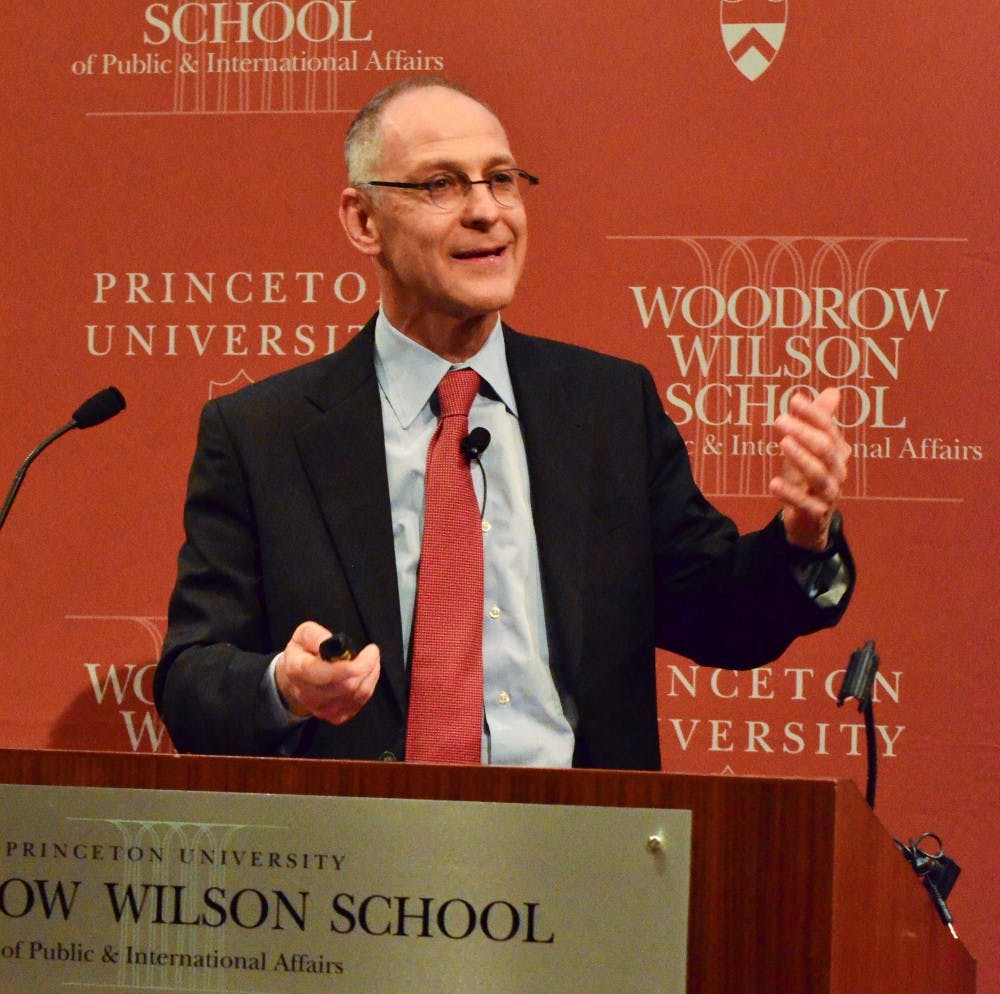Traditional health insurance companies will be replaced with Accountable Care Organizations by 2025, Ezekiel “Zeke” Emanuel, chair of the Department of Medical Ethics and Health Policy at the University of Pennsylvania said to a packed lecture hall on Monday.
Accountable care organizations, groups of doctors and hospitals that tie reimbursements to the quality of care, are beginning to assume both the clinical and financial risks for Medicaid patients, Emanuel said. This development is cutting out health care companies and profiting middlemen, who exclude certain patients and impose administrative barriers, he explained.
Total spending on health care in the United States exceeds spending within the entire French economy, reflecting both steadily rising prices and overall inefficiency, Emanuel said. He noted that even though prices are going up, demand in the health industry continues to be for very low prices, and demand for high-quality hospitals lags further behind.
“If that doesn’t make a CEO of a hospital nervous and an insomniac, I’m not sure what I can do,” Emanuel said.
The Affordable Care Act, signed by President Obama in 2010, provides effective cost-control measures for medical insurance, simplifies claim processing and improves overall quality by implementing penalties and controls, Emanuel said. He also added that he predicts the system will integrate the use of insurance vouchers for employees so they can shop for the best deals online.
“It needs to behave like it’s running a business, not like it’s running a program,” he said of the United States government. However, he said there is no chance of the United States adopting a single-payer program.
“I just don't see health care for all,” he said, adding that it was “just not an American value.”
He said he predicts that a number of hospitals will have to close following a more efficient restructuring of the health care system. When asked about job loss concerns, Emanuel explained that jobs would be shifted and redeployed in different capacities, not eliminated.
“Hospitals are a grossly inefficient way of providing jobs,” he said. “We don’t need 5,000 hospitals.”
ACOs compete aggressively to provide care at lower prices and offer referrals to highly ranked centers for serious diseases like cancer, he said.
“They have to figure out how to deliver more efficient aid in a coordinated way,” he said of ACOs. “The one thing they lack to be listed on the [health care exchange market] is the financial risk management of insurance companies. But that can be bought.”
As a result, insurance companies will have to either move into risk management or transform into integrated delivery systems by merging with a provider, Emanuel explained.

“I do believe that the health insurance companies that we all love to hate are going away,” he said. “I think this is the wave of the future.”
Although he acknowledged that there would be “growing pains,” Emanuel said most Americans will be better off after the system changes.
Emanuel also discussed the future of academic medical centers, which he said are in peril because research and training do not bring in revenue and are subject to major budget cuts. Although patient care is their main form of income, they often overcharge consumers and could not compete with accountable care organizations unless they adapted, he said.
“The dirty little secret is that most of what they do is commodity care,” he said of university clinics, noting the triple cost of a colonoscopy at NYU medical center as compared to a community hospital.
Emanuel recommended that academic institutions implement “lean production practices,” which operate on five efficiency principles, to prevent their dissipation. These principles promote the use of the entire work force, decrease errors and miscommunications and increase efficiency while spurring constant improvement, he said.
He cited the University of Denver as an example, noting that it saved $159 million over six years and increased its clinical productivity by 20 percent without laying off any employees after implementing the production practices.
Another productive solution for medical schools, Emanuel said, is to transform the medical education system, which has not undergone significant reform since 1910. The current system puts little emphasis on health systems or policy and provides almost no clinical training outside of the hospital. The current system does not address issues of team work and integration, he added.
“[Students] are not prepared for the future,” Emanuel said, adding that “they can barely talk with a patient.”
He said that medical schools could solve this problem by shortening residencies and fellowships from four to three years and providing more practical experiences beyond the hospital.
Ezekiel Emanuel is a bioethicist and fellow at the Hastings Center, a nonprofit bioethics research institute. He has taught at the University of Pennsylvania since 2011, and holds a joint appointment at the University of Pennsylvania School of Medicine and the Wharton School. Emanuel based his lecture on two of the “megatrends” outlined in his new book “Reinventing American Healthcare.”
Emanuel’s lecture, “Megatrends in Healthcare,” took place in Dodds Auditorium in Robertson Hall at 4:30 p.m. on Monday.








